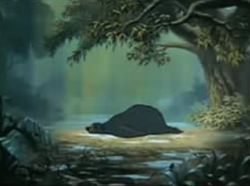 Towards the end of Disney’s The Jungle Book, there is a climactic fight between the tiger Shere Khan, and Baloo the bear, who is protecting Mowgli from the tiger’s claws. The bear is no match for the tiger, and soon lies stricken on the jungle floor; only Mowgli’s use of man’s great secret, fire, causes the tiger to flee. But it is too late to save Baloo. A wise and consoling Bagheera comforts the grieving Mowgli, and sings a song of valedictory praise to Baloo’s greatness. Only, Baloo isn’t dead. Unlike Bagheera and Mowgli, we see the bear’s eyes open, and hear his mumbling delight at his own magnificence (“…he’s crackin’ me up…I wish my mother could’ve heard this…”). As the panther draws to a close, and he and Mowgli start to leave, Baloo suddenly looks up and calls out: “Hey! Don’t stop now Baggy, you’re doing great! There’s more – lots more!”
Towards the end of Disney’s The Jungle Book, there is a climactic fight between the tiger Shere Khan, and Baloo the bear, who is protecting Mowgli from the tiger’s claws. The bear is no match for the tiger, and soon lies stricken on the jungle floor; only Mowgli’s use of man’s great secret, fire, causes the tiger to flee. But it is too late to save Baloo. A wise and consoling Bagheera comforts the grieving Mowgli, and sings a song of valedictory praise to Baloo’s greatness. Only, Baloo isn’t dead. Unlike Bagheera and Mowgli, we see the bear’s eyes open, and hear his mumbling delight at his own magnificence (“…he’s crackin’ me up…I wish my mother could’ve heard this…”). As the panther draws to a close, and he and Mowgli start to leave, Baloo suddenly looks up and calls out: “Hey! Don’t stop now Baggy, you’re doing great! There’s more – lots more!”
The point is, of course, that not everyone who appears dead, or in a coma, or a persistent vegetative state is necessarily unaware of their surroundings. Sometimes, we now learn, patients who appear to have no sign of consciousness can hear and understand every word that’s being said.
Recent elegant research – research of the “d’oh, why didn’t I think of that!” kind – (news story here, original paper here) shows that a small number of patients who appear to be in a vegetative state and fully incommunicado, are in fact aware of their surroundings. They are receiving loud and clear; it is just the transmit button that doesn’t work.
It is important to note that until the tests were run, some of these patients were believed to have no consciousness whatsoever. How wrong, we now find, we were.
We shall never know whether Tom Inglis, first damaged and then killed by his mother, was set to receive. Prior to his mother’s first attempt to kill him, they were nursing reports of improvements in his condition. Yet, his mother knew best. She had ‘love in her heart’, and claimed maternal authority – and that meant terminating Tom.
We can now see all too clearly how dangerous such claims to maternal authority can be. Just as with doctors, mother doesn’t always know best. Wilful intentional killing – murder, that is – of an individual presumed to lack consciousness risks killing a sentient being. It can never be acceptable.
And yet, Inglis continues to show no remorse. She continues to claim maternal anguish and authority. She is even to appeal – on the grounds of slow burn provocation – a defence most commonly used in domestic violence. What, we might ask, did silent Tom do to provoke Frances Inglis?
